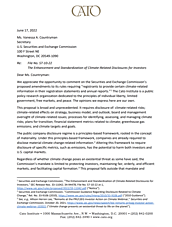Dear Ms. Countryman:
We appreciate the opportunity to comment on the Securities and Exchange Commission’s proposed amendments to its rules requiring “registrants to provide certain climate-related information in their registration statements and annual reports.” The Cato Institute is a public policy research organization dedicated to the principles of individual liberty, limited government, free markets, and peace. The opinions we express here are our own.
This proposal is broad and unprecedented. It requires disclosure of: climate-related risks; climate-related effects on strategy, business model, and outlook; board and management oversight of climate-related issues; processes for identifying, assessing, and managing climate risks; plans for transition; financial statement metrics related to climate; greenhouse gas emissions; and climate targets and goals.
The public company disclosure regime is a principles-based framework, rooted in the concept of materiality. Under this principles-based framework, companies are already required to disclose material climate change-related information. Altering this framework to require disclosure of specific metrics, such as emissions, has the potential to harm both investors and U.S. capital markets.
Regardless of whether climate change poses an existential threat as some have said, the Commission’s mandate is limited to protecting investors, maintaining fair, orderly, and efficient markets, and facilitating capital formation.3 This proposal falls outside that mandate and outside of the Commission’s authority. Indeed, aspects of this proposal fall outside of the Constitution. But, even if the Commission had the authority to promulgate what it has proposed here, these costly disclosure requirements are not an improvement over the current disclosure framework, which already requires disclosure of material risks relating to climate change. The comments below focus on fundamental issues with the proposal that require the Commission to abandon this effort in its current form.

This work is licensed under a Creative Commons Attribution-NonCommercial-ShareAlike 4.0 International License.



